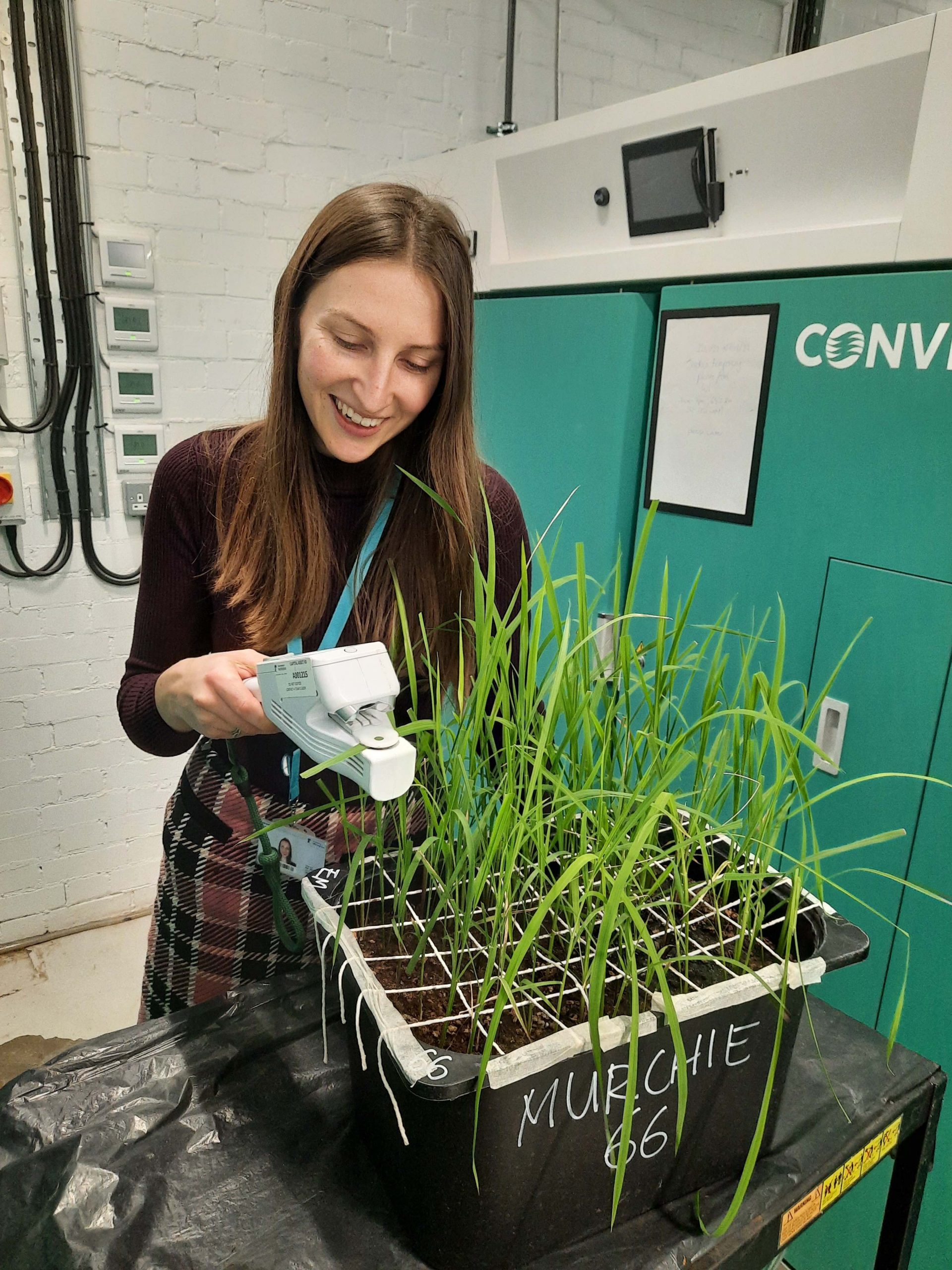
November 29, 2022, by Lexi Earl
Can we improve heat tolerance in rice? An interview with Dr Jordan Robson
Jordan Robson works on heat tolerance in rice populations. She is a Postdoctoral Research Fellow with the Palaeobenchmarking Resilient Agricultural Systems project. Prior to this she completed her PhD in Prof Zoe Wilson’s lab in Plant Sciences at UoN.
Tell me about your work. What is your research about?
My research is based on the idea of future proofing crops to withstand climate change.
As a post-doc on the Palaeobenchmarking Resilient Agricultural Systems project (PalaeoRAS for short) I work within two lab groups in Plant & Crop Sciences on the Sutton Bonington campus. Each group focuses on different aspects of plant growth & development: reproduction (Wilson lab) and photosynthesis (Murchie lab), but both are linked through a common interest in the effects of abiotic stresses. We work on a whole range of species from the small model plant Arabidopsis thaliana, to UK-grown crops such as wheat, barley and oilseed rape, to the more exotic (and my personal favourites): African and Asian Rice.
Using exciting new high-throughput methods based on chlorophyll fluorescence we’ve been characterising heat tolerance in large rice populations and using Genome Wide Association Studies (GWAS) to search for the genes responsible for that tolerance.
What current projects are you working on?
At the moment I’m working on heat acclimation: how fast a plant will sense increased temperature and alter its physiology to cope with it. I’m also characterising genes highlighted from the GWAS in hope that they will be good targets for improving heat-tolerance in commercial rice varieties.
How did you become interested in this field? How did you become interested in science?
Science has fascinated me from an early age and was always my favourite class in school, so it seemed the natural step to study biological sciences at university. My undergraduate course was an eclectic and exciting mix of topics from ecology to neuroethology. But plant sciences really stood out. With climate change and food security some of the biggest issues facing us, plant science felt to me like an area in which I could potentially make a huge difference: tackle the problems to feed the world.
Tell me a little about your research career?
Having decided to pursue a career in plant sciences I joined Nottingham’s BBSRC Doctoral Training Partnership straight from my BSc back in 2016. After rotations working on drought stress and nutrient uptake in rice and maize, I settled into Zoe Wilson’s lab to study how light and temperature influences pollen development. In 2019, I went over to the Netherlands for an internship with Syngenta’s Brassica breeding team and then it was back to the PhD for my final year. I was very fortunate to have such a supportive supervisor in Zoe and when this post-doc position opened up at the end of my PhD I jumped at the chance to continue working in the team whilst developing some new skills in crop physiology.
Why Future Food?
Being part of the Future Food Beacon has allowed me to look beyond plant & crop sciences to the food system as a whole. With fantastic colleagues from food sciences, geography and computer sciences you can’t help but gain a new perspective on your own research. It’s been a fantastic platform for sharing knowledge and generating new ideas.
Is your research easily applicable in ordinary settings?
This project has helped develop a fantastic new phenotyping tool (credit here to John Ferguson, Lorna McAusland and Jon Atkinson!) that is high-throughput, requires no specialised growth facilities and generates data on traits that have a strong genetic basis; making it ideal for crop breeders. We hope that this technology can be applied to crops around the world to breed in beneficial traits. (All will be revealed soon so watch this space!)
Explain your research to an ordinary person?
Carbon fixation through photosynthesis is at the very base of our food chain, providing energy and yield in the crops that we eat and feed to our livestock. Climate stresses such as heat and drought disrupt photosynthetic processes and cause huge losses in yield, creating issues with food availability around the world. Our research aims to identify ways to make photosynthesis more resilient to future climates so that we can maintain a steady food supply.
Does your research impact on ordinary people’s lives? How?
More than half of the world’s population rely on rice as a staple food crop and unfortunately, we see huge crop losses in response to heat. Typically, for every 1°C increase in temperature we see a 10% loss in yield. For a warming planet that has to feed more mouths on less arable land this is a big issue. Our research is looking at ways of reducing or even eliminating these losses. By identifying genes responsible for heat-tolerance we can harness natural variation within rice breeding populations to create new climate-resilient varieties. In this way we hope our research will help feed future generations around the world.
No comments yet, fill out a comment to be the first

Leave a Reply